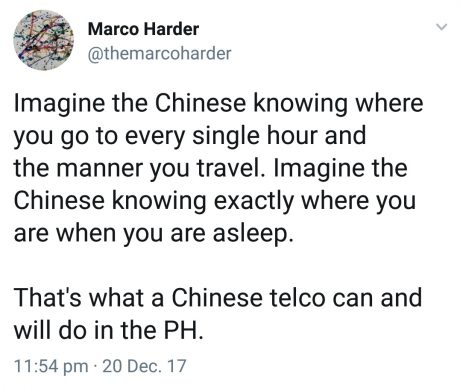
For one thing, it is a bit presumptuous to think spying on the minutiae of day-to-day lives of ordinary Filipinos is an important enough main objective for a multi-million dollar investment in network infrastructure and telco service delivery capability. There really isn’t much to learn from data collected from Filipino Internet users beyond what Facebook and Google already use these for (mainly selling consumerist trinkets and entertainment products). One just needs to check out — through publicly-accessible sites and facilities — what the “trending” topics and hashtags of the hour in the Philippines are. It’s not a pretty sight. If there is a term opposite of the colloquialism “nosebleed”, that would be the term to describe the topics Filipinos are obssessed with on a day-to-day basis.
Marketers don’t even need sophisticated Big Data analytics to figure out what Filipino consumers want. For that, they just need to watch noontime Filipino television to figure out the best products (and media entertainment genres) to pitch to Filipino consumers. As for the task of amassing data sets useful for mining insights relevant to military intelligence, well, one would be hard-pressed to think of a military application for data collected from Filipino “millennial” chatter about their imported Chinese-made fashion accessories.
In short, the sort of “spying” Filipino “activists” are screeching about is not worth anyobody’s while. Filipinos are notoriously easy to manipulate en masse. They quickly flock from one outrage or feel-good fad to another at the drop of the next media bomb. Throw a Filipino a basketball and they will likely drop the packet of chicharon they had been munching on. We can see this collective behaviour even in political discourse on social media (where, one would think, the “best and brightest” of Filipino Netizens congregate). One moment they are gnashing their teeth over the “outrage” of Philippine President Rodrigo Duterte’s successful extension of Martial Law in Mindanao, then, on another, are waxing outrage poetry in Twitter “threads” over his granddaughter Isabelle Duterte’s expensive taste.

(Source: Twitter)
In light of all this, it remains glaringly evident that mainstream mass media wields far more power than any telco service armed with network ubiquity and listening devices would. Maine Mendoza would be a far more valuable asset to a corporation in the business of peddling political influence than a proprietary network of fibre-optic cables, mobile cellular towers, and satellite transponders. What these shrill “activists” clucking out outrage over a Chinese-owned telco provider playing in the Philippine market fail to realise is that Filipinos’ own domestic mass media corporations have, for so long, already been doing what these “activists” have been fear-mongering about.
Filipinos don’t need shady Chinese or Russian propagandists to influence their politics. Their own local “thought leaders” are already doing that, thank you very much. They do not need a telco network to glean insight on what makes the Filipino mind tick. Eat Bulaga had already figured that out way back in the 1970s. Thank you very much.
What Filipinos should actually be thankful for is seeing a third telco player rescue their lot from the “services” of the current Telco monopolies. Just assume the position. Hostile, dog style, any style will do.

No comments:
Post a Comment